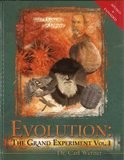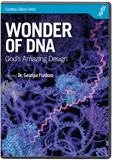The Nature of Myth
A college professor lambastes AiG for “perpetuating a myth” but, in turn, perpetuates a myth about natrual selection.
How sad that you have put all this effort into perpetuating the myths of the Bible instead of educating the public about the truth of evolution and natural selection.
—C.B., U.S.
How sad that you have put all this effort into perpetuating the myths of the Bible
How do you know the Bible is a book of myths? What is your basis for saying that the Bible is a book of myths? What is your basis for determining what is myth and what is reality? According to the evolutionary worldview (perhaps yours?), the determination of myth and reality is due to nothing more than the chemical interactions in the brain of an individual. Therefore, what is myth to one person might be reality to another and vice versa. There is no way to determine what is myth and reality using an evolutionary worldview.
However, using a biblical worldview, myth and reality can be distinguished. For example, God tells us in Genesis 1 that He created the universe and everything in it by His spoken word (“And God said”) in six 24-hour days.
instead of educating the public about the truth of evolution and natural selection.
Again, what is your basis for deciding truth? According to the evolutionary worldview, truth is determined by man. The determination of truth is also nothing more than the result of chemical interactions in the brain and varies among individuals. Therefore, what is truth to one person might not be to another and vice versa. There is no way to determine truth using an evolutionary worldview.
Learning to Trust
I want to thank your ministry for being there, yes just being there. Often it seems that when we are searching for an answer, we get lost in a world of information. That happened to me not too long ago. I was searching for information to help me believe that the Bible was real. I found a lot of information, but I seldom found information that had backing, evidence that could be researched and found to be documented. Many people make claims, and too often people who see information and want to believe can’t because they don’t see the proof. For a person who doesn’t believe the Bible is real, they don’t need much information to turn them away. Your site helps to take away that excuse. I can only imagine the [number of] people who were on the precipice of conversion who stumbled onto your site as I did. We will always struggle with doubt, but it is so comforting to know that we have a place to go where we can see like-minded scientists working to interpret the evidence for the Bible.
—W.W., U.S.
However, using a biblical worldview, truth can be determined. For example, God tells us in Genesis 1 that He created plants, fish, birds, and animals according to their kind. A more technical term for kind is baramin (bara = created, min = kind). Most likely this refers to the family or order level in taxonomic terms. It is a logical deduction that they were to reproduce within those kinds, and scientific observation bears this out. For example, Natural Selection (and sometimes artificial selection) has resulted in a large variety of species within the dog kind. What has never been observed is a dog becoming a cat. So, while natural selection can account for variation within a kind, it does not account for one kind becoming another kind.
Some would say that since much time is needed for molecules-to-man evolution, it cannot and will not be observed in our current time. Transitional fossils are often given as evidence that one kind of animal can eventually evolve into another kind. Darwin predicted that the fossil record would show numerous transitional fossils. However, even a century and a half later, all we have are a handful of disputable examples.
It seems you are equivocating evolution and natural selection. Evolution is basically defined as “descent with modification.” This can mean that given time, chance, and natural laws, bacteria can evolve into baseball players. But this type of change requires an increase in genetic information. Humans contain information on how to make brains, eyes, and legs (to name a few) that doesn’t exist in bacteria. This information-gaining form of evolution has never been observed or confirmed through scientific observation.
Natural selection is properly defined as a process whereby organisms possessing specific characteristics (reflective of their genetic makeup) survive better in a given environment or under a given selective pressure. Those with certain characteristics live, and those without them diminish in number or die. Natural selection was described by a creationist, Edward Blyth, some 25 years before Darwin published Origin of Species. Natural selection has been observed and confirmed through scientific observation.
Many evolutionists believe that mutation and natural selection are mechanisms which increase genetic information. However, operational science (science done in the here and now) has shown that mutations and natural selection decrease or degrade genetic information—the changes are moving in the wrong direction!
Let’s use the example of antibiotic resistance in bacteria, which is often touted as an example of “evolution in action.” Antibiotics usually bind a protein in the bacterium and prevent it from functioning properly, killing the bacteria. Antibiotic-resistant bacteria have a mutation in the DNA which codes for that protein. The antibiotic, then, cannot bind to the protein produced from the mutated DNA, and thus, the bacteria survive. Although the bacteria can survive in an environment with antibiotics, it has come at a cost. If the antibiotic-resistant bacteria are grown with the non-mutant bacteria in an environment without antibiotics, the non-mutant bacteria will live and the mutant bacteria will diminish. This is because the mutant bacteria have lost the ability to make a protein important for them to compete with other bacteria for necessary nutrients.
Let’s review what natural selection (and mutation) accomplish:
- Through mutation, genetic information was lost.
- Antibiotic-resistant bacteria survive well in an environment with antibiotics; they are less able to survive in the wild.
- Particular mutations in bacterial populations are selected for (no new genetic information is added).
- Bacteria are still bacteria. No evolution has taken place to change it into something else—it’s still the same bacteria with some variation.
We do seek to educate the public about the truth of evolution and natural selection. Natural selection is supported by the biblical and scientific evidence, while evolution is not. Natural selection is reality, supported by operational science; evolution (the kind requiring an increase in information) is myth. It saddens me to see masses of students coming out of evolutionary dominated schools who can’t even distinguish these basic differences between natural selection and evolution. So, what does this say about evolutionary teaching and education?
For more information:
Recommended Resources

Answers in Genesis is an apologetics ministry, dedicated to helping Christians defend their faith and proclaim the good news of Jesus Christ.
- Customer Service 800.778.3390
- © 2025 Answers in Genesis






